Exploring the Treaty of Waitangi Principles & Their Relevance
VerifiedAdded on 2023/06/05
|7
|1726
|313
Essay
AI Summary
This essay examines the principles of the Treaty of Waitangi and their relevance to New Zealand society, highlighting its role as a framework for indigenous Māori to seek legal redress concerning Crown practices or policy. It emphasizes the core principles of participation, partnership, and protection, which are contextualized under the Treaty of Waitangi Act 1975 and subsequent laws. The essay discusses the establishment and function of the Waitangi Tribunal as a legal avenue for Māori communities and explores how the tribunal has developed and enhanced public understanding of vital treaty principles, such as good faith, mutual exchange, development, and consultation. It concludes that the Treaty's principles are binding on all New Zealand citizens and are crucial for ensuring peace, security, positive co-existence, and fruitful partnerships between indigenous Māori communities and settlers.
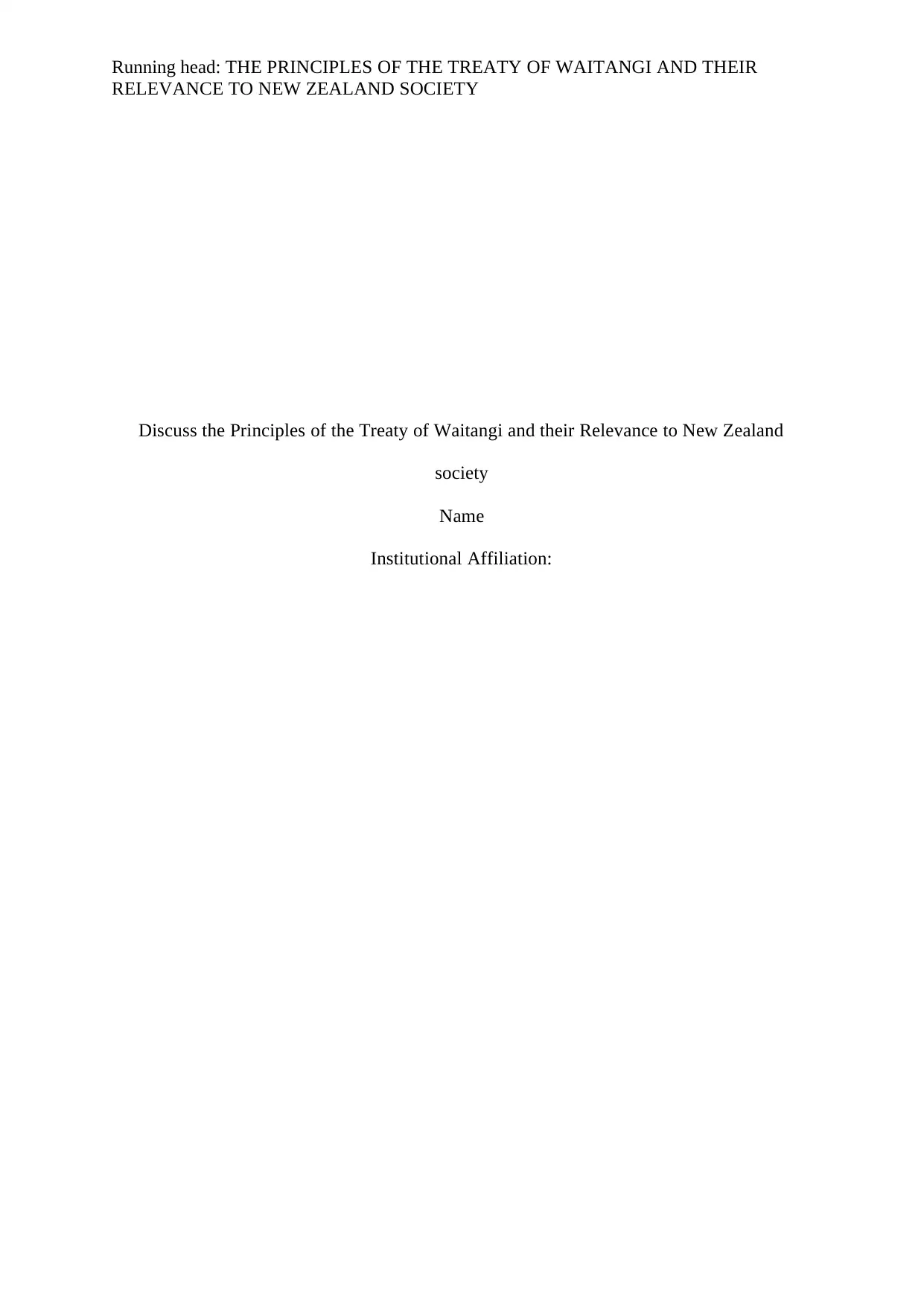
Running head: THE PRINCIPLES OF THE TREATY OF WAITANGI AND THEIR
RELEVANCE TO NEW ZEALAND SOCIETY
Discuss the Principles of the Treaty of Waitangi and their Relevance to New Zealand
society
Name
Institutional Affiliation:
RELEVANCE TO NEW ZEALAND SOCIETY
Discuss the Principles of the Treaty of Waitangi and their Relevance to New Zealand
society
Name
Institutional Affiliation:
Paraphrase This Document
Need a fresh take? Get an instant paraphrase of this document with our AI Paraphraser
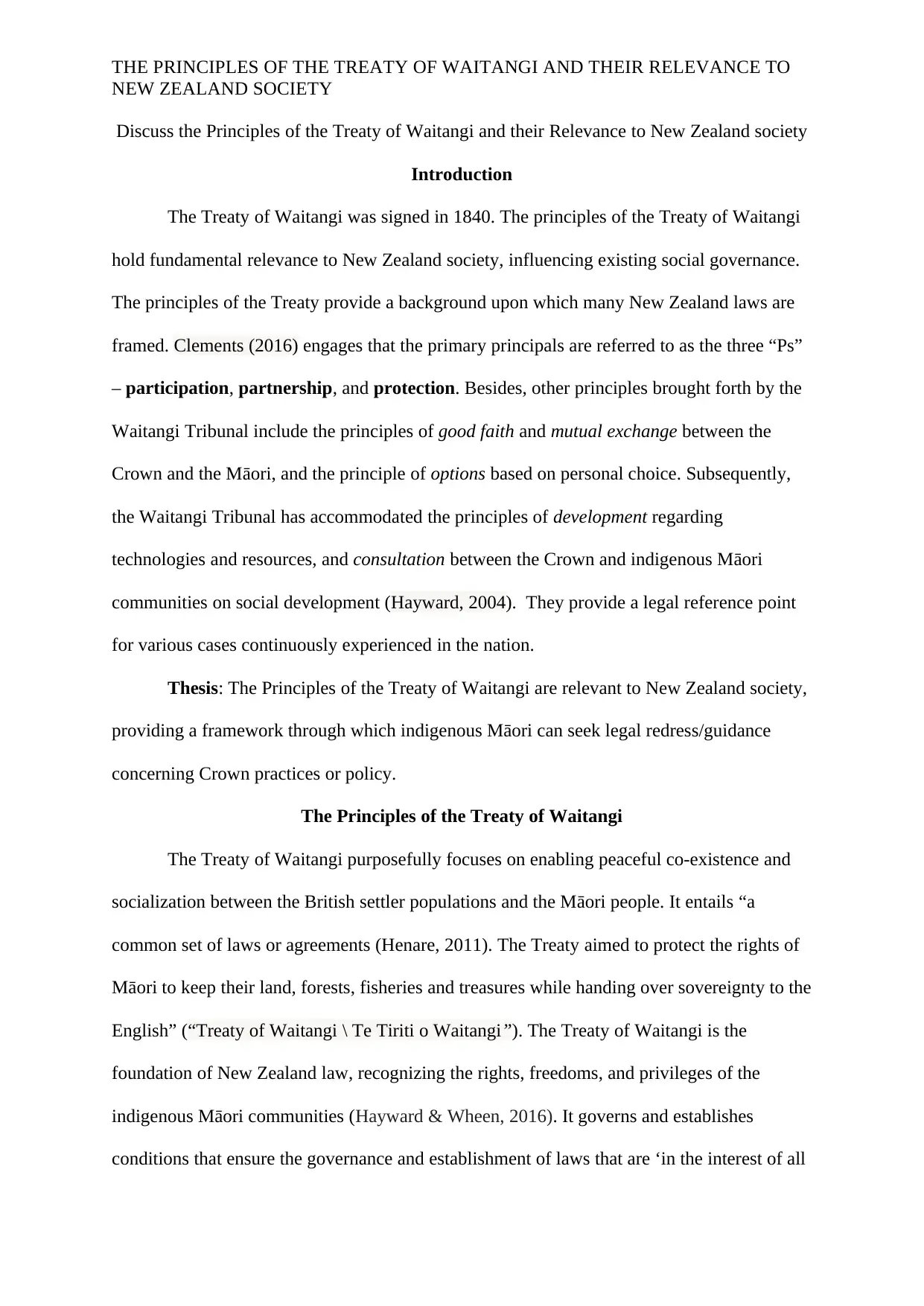
THE PRINCIPLES OF THE TREATY OF WAITANGI AND THEIR RELEVANCE TO
NEW ZEALAND SOCIETY
Discuss the Principles of the Treaty of Waitangi and their Relevance to New Zealand society
Introduction
The Treaty of Waitangi was signed in 1840. The principles of the Treaty of Waitangi
hold fundamental relevance to New Zealand society, influencing existing social governance.
The principles of the Treaty provide a background upon which many New Zealand laws are
framed. Clements (2016) engages that the primary principals are referred to as the three “Ps”
– participation, partnership, and protection. Besides, other principles brought forth by the
Waitangi Tribunal include the principles of good faith and mutual exchange between the
Crown and the Māori, and the principle of options based on personal choice. Subsequently,
the Waitangi Tribunal has accommodated the principles of development regarding
technologies and resources, and consultation between the Crown and indigenous Māori
communities on social development (Hayward, 2004). They provide a legal reference point
for various cases continuously experienced in the nation.
Thesis: The Principles of the Treaty of Waitangi are relevant to New Zealand society,
providing a framework through which indigenous Māori can seek legal redress/guidance
concerning Crown practices or policy.
The Principles of the Treaty of Waitangi
The Treaty of Waitangi purposefully focuses on enabling peaceful co-existence and
socialization between the British settler populations and the Māori people. It entails “a
common set of laws or agreements (Henare, 2011). The Treaty aimed to protect the rights of
Māori to keep their land, forests, fisheries and treasures while handing over sovereignty to the
English” (“Treaty of Waitangi \ Te Tiriti o Waitangi”). The Treaty of Waitangi is the
foundation of New Zealand law, recognizing the rights, freedoms, and privileges of the
indigenous Māori communities (Hayward & Wheen, 2016). It governs and establishes
conditions that ensure the governance and establishment of laws that are ‘in the interest of all
NEW ZEALAND SOCIETY
Discuss the Principles of the Treaty of Waitangi and their Relevance to New Zealand society
Introduction
The Treaty of Waitangi was signed in 1840. The principles of the Treaty of Waitangi
hold fundamental relevance to New Zealand society, influencing existing social governance.
The principles of the Treaty provide a background upon which many New Zealand laws are
framed. Clements (2016) engages that the primary principals are referred to as the three “Ps”
– participation, partnership, and protection. Besides, other principles brought forth by the
Waitangi Tribunal include the principles of good faith and mutual exchange between the
Crown and the Māori, and the principle of options based on personal choice. Subsequently,
the Waitangi Tribunal has accommodated the principles of development regarding
technologies and resources, and consultation between the Crown and indigenous Māori
communities on social development (Hayward, 2004). They provide a legal reference point
for various cases continuously experienced in the nation.
Thesis: The Principles of the Treaty of Waitangi are relevant to New Zealand society,
providing a framework through which indigenous Māori can seek legal redress/guidance
concerning Crown practices or policy.
The Principles of the Treaty of Waitangi
The Treaty of Waitangi purposefully focuses on enabling peaceful co-existence and
socialization between the British settler populations and the Māori people. It entails “a
common set of laws or agreements (Henare, 2011). The Treaty aimed to protect the rights of
Māori to keep their land, forests, fisheries and treasures while handing over sovereignty to the
English” (“Treaty of Waitangi \ Te Tiriti o Waitangi”). The Treaty of Waitangi is the
foundation of New Zealand law, recognizing the rights, freedoms, and privileges of the
indigenous Māori communities (Hayward & Wheen, 2016). It governs and establishes
conditions that ensure the governance and establishment of laws that are ‘in the interest of all
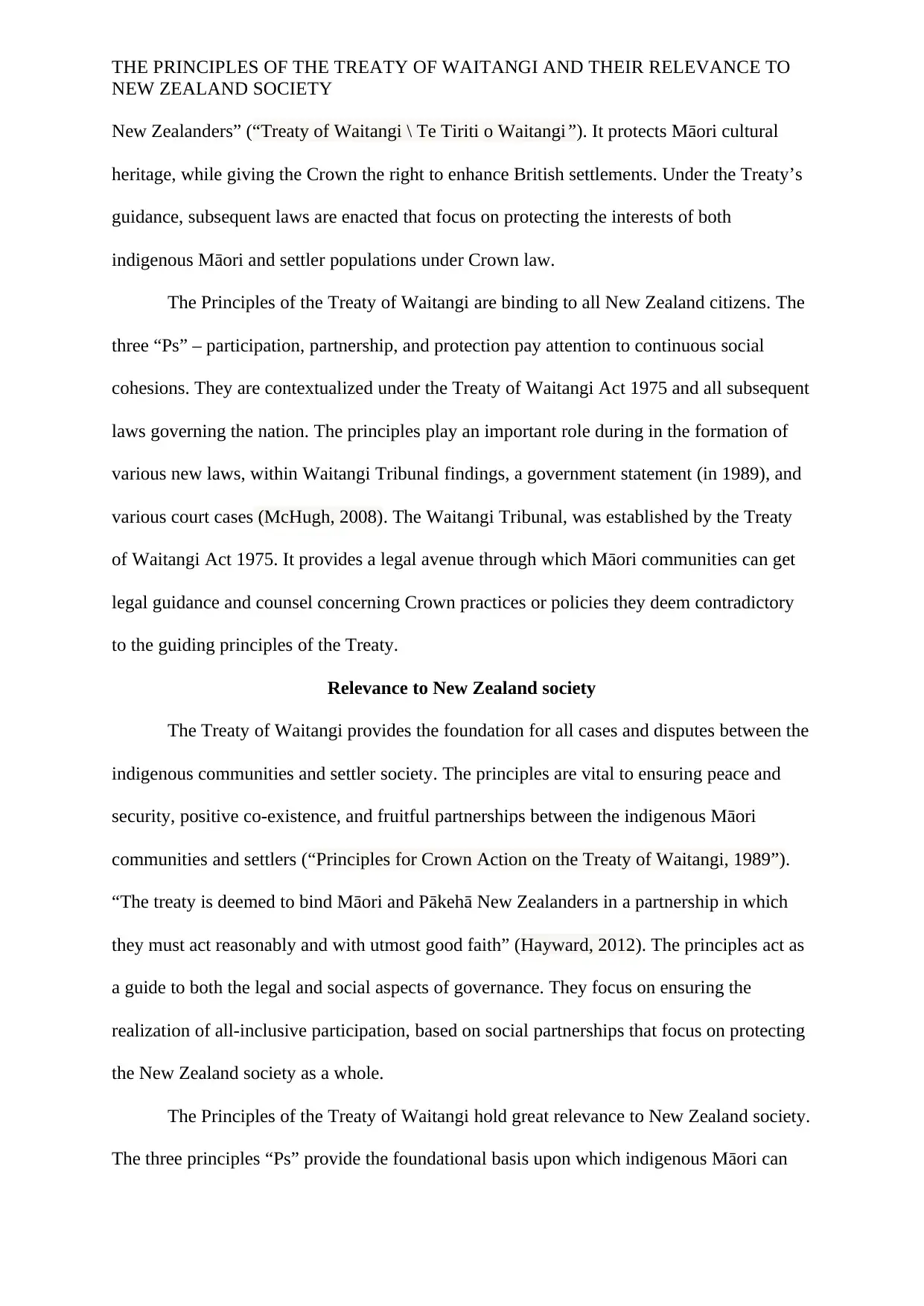
THE PRINCIPLES OF THE TREATY OF WAITANGI AND THEIR RELEVANCE TO
NEW ZEALAND SOCIETY
New Zealanders” (“Treaty of Waitangi \ Te Tiriti o Waitangi”). It protects Māori cultural
heritage, while giving the Crown the right to enhance British settlements. Under the Treaty’s
guidance, subsequent laws are enacted that focus on protecting the interests of both
indigenous Māori and settler populations under Crown law.
The Principles of the Treaty of Waitangi are binding to all New Zealand citizens. The
three “Ps” – participation, partnership, and protection pay attention to continuous social
cohesions. They are contextualized under the Treaty of Waitangi Act 1975 and all subsequent
laws governing the nation. The principles play an important role during in the formation of
various new laws, within Waitangi Tribunal findings, a government statement (in 1989), and
various court cases (McHugh, 2008). The Waitangi Tribunal, was established by the Treaty
of Waitangi Act 1975. It provides a legal avenue through which Māori communities can get
legal guidance and counsel concerning Crown practices or policies they deem contradictory
to the guiding principles of the Treaty.
Relevance to New Zealand society
The Treaty of Waitangi provides the foundation for all cases and disputes between the
indigenous communities and settler society. The principles are vital to ensuring peace and
security, positive co-existence, and fruitful partnerships between the indigenous Māori
communities and settlers (“Principles for Crown Action on the Treaty of Waitangi, 1989”).
“The treaty is deemed to bind Māori and Pākehā New Zealanders in a partnership in which
they must act reasonably and with utmost good faith” (Hayward, 2012). The principles act as
a guide to both the legal and social aspects of governance. They focus on ensuring the
realization of all-inclusive participation, based on social partnerships that focus on protecting
the New Zealand society as a whole.
The Principles of the Treaty of Waitangi hold great relevance to New Zealand society.
The three principles “Ps” provide the foundational basis upon which indigenous Māori can
NEW ZEALAND SOCIETY
New Zealanders” (“Treaty of Waitangi \ Te Tiriti o Waitangi”). It protects Māori cultural
heritage, while giving the Crown the right to enhance British settlements. Under the Treaty’s
guidance, subsequent laws are enacted that focus on protecting the interests of both
indigenous Māori and settler populations under Crown law.
The Principles of the Treaty of Waitangi are binding to all New Zealand citizens. The
three “Ps” – participation, partnership, and protection pay attention to continuous social
cohesions. They are contextualized under the Treaty of Waitangi Act 1975 and all subsequent
laws governing the nation. The principles play an important role during in the formation of
various new laws, within Waitangi Tribunal findings, a government statement (in 1989), and
various court cases (McHugh, 2008). The Waitangi Tribunal, was established by the Treaty
of Waitangi Act 1975. It provides a legal avenue through which Māori communities can get
legal guidance and counsel concerning Crown practices or policies they deem contradictory
to the guiding principles of the Treaty.
Relevance to New Zealand society
The Treaty of Waitangi provides the foundation for all cases and disputes between the
indigenous communities and settler society. The principles are vital to ensuring peace and
security, positive co-existence, and fruitful partnerships between the indigenous Māori
communities and settlers (“Principles for Crown Action on the Treaty of Waitangi, 1989”).
“The treaty is deemed to bind Māori and Pākehā New Zealanders in a partnership in which
they must act reasonably and with utmost good faith” (Hayward, 2012). The principles act as
a guide to both the legal and social aspects of governance. They focus on ensuring the
realization of all-inclusive participation, based on social partnerships that focus on protecting
the New Zealand society as a whole.
The Principles of the Treaty of Waitangi hold great relevance to New Zealand society.
The three principles “Ps” provide the foundational basis upon which indigenous Māori can
⊘ This is a preview!⊘
Do you want full access?
Subscribe today to unlock all pages.

Trusted by 1+ million students worldwide

THE PRINCIPLES OF THE TREATY OF WAITANGI AND THEIR RELEVANCE TO
NEW ZEALAND SOCIETY
positively co-exist and interact with Pākehā New Zealanders (“Principles of the Treaty: The
Waitangi Tribunal and Treaty principles”) (Crocket, 2009). The three principles of
participation, partnership, and protection “underpin the relationship between the Government
and Māori under the Treaty of Waitangi. These principles are derived from the underlying
tenets of the Treaty. They are used to bridge the gap between the literal differences between
the Māori and English texts” (Clements 2016). The Treaty of Waitangi, in both English and
Māori translation, focuses on enabling better social engagements between the culturally
different population groups currently inhabiting the Pacific Island nation.
The Treaty of Waitangi, provides the foundation for the Treaty of Waitangi Act 1975,
upon which the Waitangi Tribunal is established. “In order to apply the treaty in a context
relevant to the Crown and Māori in the present day, the Waitangi Tribunal and the courts
have considered the broad sentiments, intentions and goals of the treaty, and identified its
principles on a case-by-case basis” (Hayward, 2012). Gradually, a number of the principles
have become legally established, with others developing over time. The tribunal helps
indigenous Māori people to claim redress or guidance about one or more Crown practices or
policies that are or were inconsistent with the three principles of the treaty (Kingi, 2007).
Concerns revolve around land and fisheries disputes, cultural tolerance and inclusion, natural
resource use and development, and inclusion in policy-making.
The Waitangi Tribunal has over time helped develop and enhance public
understanding of other vital treaty principles. For example, the principles of good faith and
partnership are fundamentally linked to the principle of exchange. Both the Crown and the
Māori are required to act with utmost good faith and reasonably. The Crown has a fiduciary
duty regarding decision-making around energy and radio broadcasting assets. The principle
of development is applied to technology use and resource development, with the consultation
principle ensuring all-inclusive negotiations for the betterment of the society. However, some
NEW ZEALAND SOCIETY
positively co-exist and interact with Pākehā New Zealanders (“Principles of the Treaty: The
Waitangi Tribunal and Treaty principles”) (Crocket, 2009). The three principles of
participation, partnership, and protection “underpin the relationship between the Government
and Māori under the Treaty of Waitangi. These principles are derived from the underlying
tenets of the Treaty. They are used to bridge the gap between the literal differences between
the Māori and English texts” (Clements 2016). The Treaty of Waitangi, in both English and
Māori translation, focuses on enabling better social engagements between the culturally
different population groups currently inhabiting the Pacific Island nation.
The Treaty of Waitangi, provides the foundation for the Treaty of Waitangi Act 1975,
upon which the Waitangi Tribunal is established. “In order to apply the treaty in a context
relevant to the Crown and Māori in the present day, the Waitangi Tribunal and the courts
have considered the broad sentiments, intentions and goals of the treaty, and identified its
principles on a case-by-case basis” (Hayward, 2012). Gradually, a number of the principles
have become legally established, with others developing over time. The tribunal helps
indigenous Māori people to claim redress or guidance about one or more Crown practices or
policies that are or were inconsistent with the three principles of the treaty (Kingi, 2007).
Concerns revolve around land and fisheries disputes, cultural tolerance and inclusion, natural
resource use and development, and inclusion in policy-making.
The Waitangi Tribunal has over time helped develop and enhance public
understanding of other vital treaty principles. For example, the principles of good faith and
partnership are fundamentally linked to the principle of exchange. Both the Crown and the
Māori are required to act with utmost good faith and reasonably. The Crown has a fiduciary
duty regarding decision-making around energy and radio broadcasting assets. The principle
of development is applied to technology use and resource development, with the consultation
principle ensuring all-inclusive negotiations for the betterment of the society. However, some
Paraphrase This Document
Need a fresh take? Get an instant paraphrase of this document with our AI Paraphraser
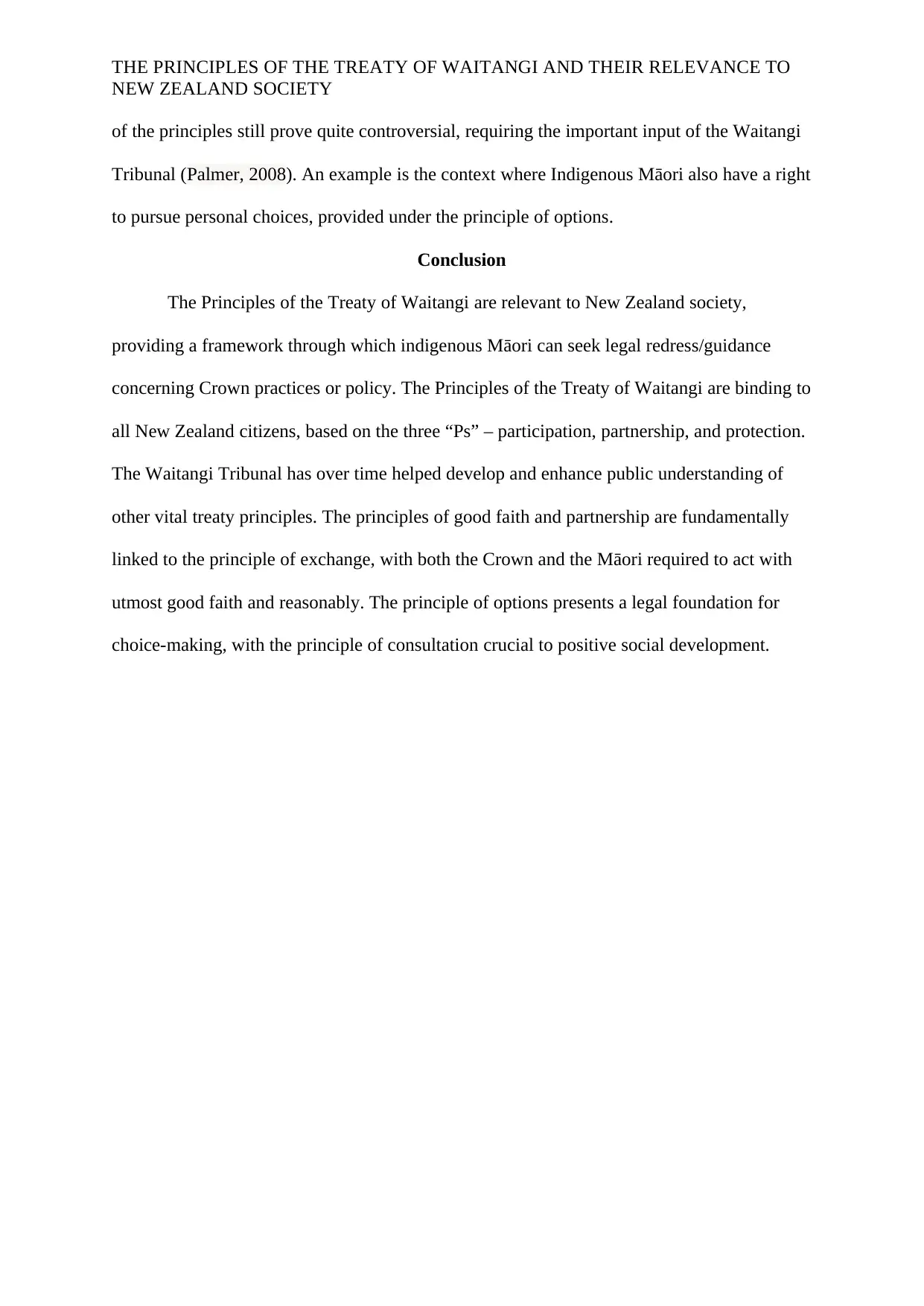
THE PRINCIPLES OF THE TREATY OF WAITANGI AND THEIR RELEVANCE TO
NEW ZEALAND SOCIETY
of the principles still prove quite controversial, requiring the important input of the Waitangi
Tribunal (Palmer, 2008). An example is the context where Indigenous Māori also have a right
to pursue personal choices, provided under the principle of options.
Conclusion
The Principles of the Treaty of Waitangi are relevant to New Zealand society,
providing a framework through which indigenous Māori can seek legal redress/guidance
concerning Crown practices or policy. The Principles of the Treaty of Waitangi are binding to
all New Zealand citizens, based on the three “Ps” – participation, partnership, and protection.
The Waitangi Tribunal has over time helped develop and enhance public understanding of
other vital treaty principles. The principles of good faith and partnership are fundamentally
linked to the principle of exchange, with both the Crown and the Māori required to act with
utmost good faith and reasonably. The principle of options presents a legal foundation for
choice-making, with the principle of consultation crucial to positive social development.
NEW ZEALAND SOCIETY
of the principles still prove quite controversial, requiring the important input of the Waitangi
Tribunal (Palmer, 2008). An example is the context where Indigenous Māori also have a right
to pursue personal choices, provided under the principle of options.
Conclusion
The Principles of the Treaty of Waitangi are relevant to New Zealand society,
providing a framework through which indigenous Māori can seek legal redress/guidance
concerning Crown practices or policy. The Principles of the Treaty of Waitangi are binding to
all New Zealand citizens, based on the three “Ps” – participation, partnership, and protection.
The Waitangi Tribunal has over time helped develop and enhance public understanding of
other vital treaty principles. The principles of good faith and partnership are fundamentally
linked to the principle of exchange, with both the Crown and the Māori required to act with
utmost good faith and reasonably. The principle of options presents a legal foundation for
choice-making, with the principle of consultation crucial to positive social development.
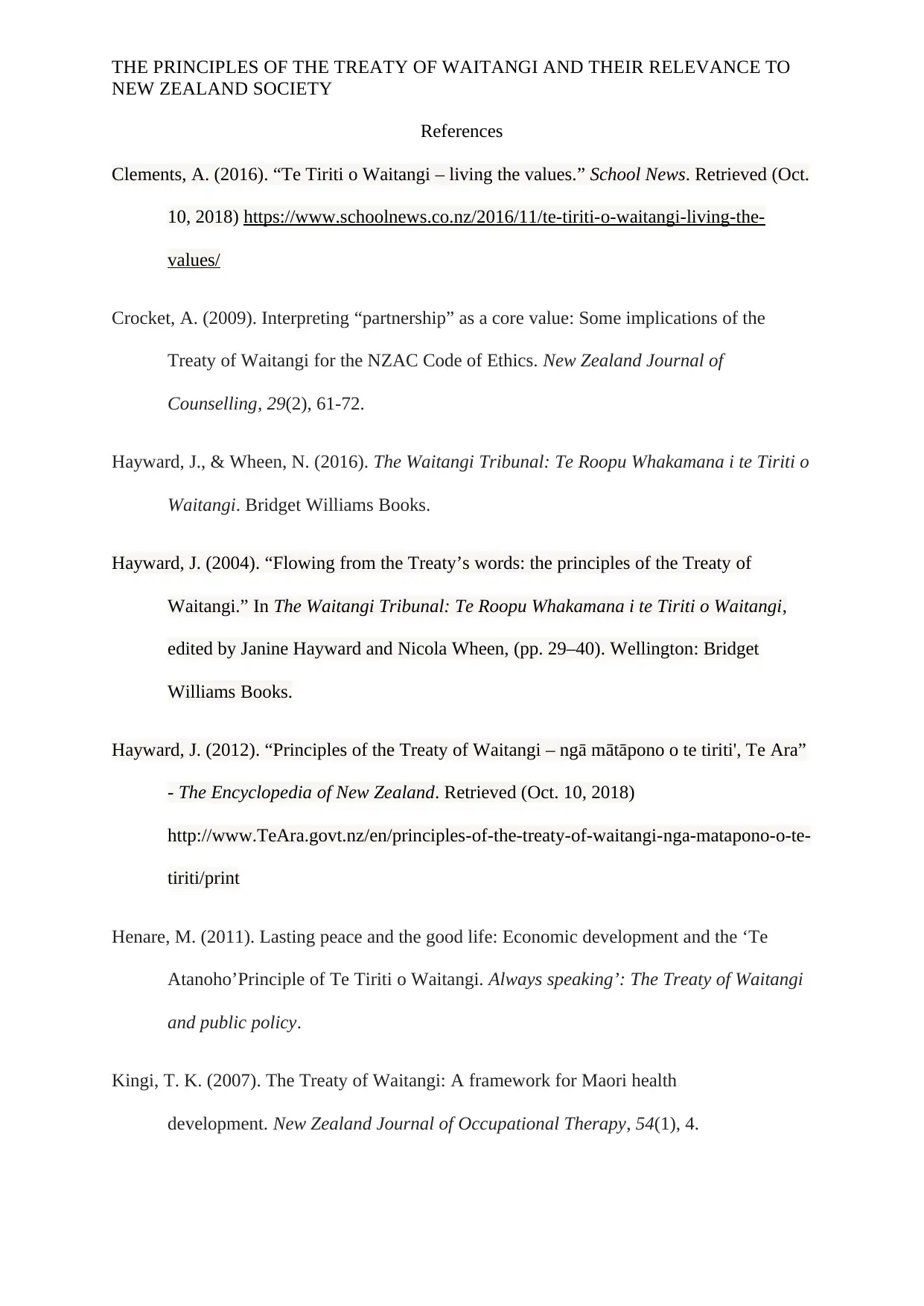
THE PRINCIPLES OF THE TREATY OF WAITANGI AND THEIR RELEVANCE TO
NEW ZEALAND SOCIETY
References
Clements, A. (2016). “Te Tiriti o Waitangi – living the values.” School News. Retrieved (Oct.
10, 2018) https://www.schoolnews.co.nz/2016/11/te-tiriti-o-waitangi-living-the-
values/
Crocket, A. (2009). Interpreting “partnership” as a core value: Some implications of the
Treaty of Waitangi for the NZAC Code of Ethics. New Zealand Journal of
Counselling, 29(2), 61-72.
Hayward, J., & Wheen, N. (2016). The Waitangi Tribunal: Te Roopu Whakamana i te Tiriti o
Waitangi. Bridget Williams Books.
Hayward, J. (2004). “Flowing from the Treaty’s words: the principles of the Treaty of
Waitangi.” In The Waitangi Tribunal: Te Roopu Whakamana i te Tiriti o Waitangi,
edited by Janine Hayward and Nicola Wheen, (pp. 29–40). Wellington: Bridget
Williams Books.
Hayward, J. (2012). “Principles of the Treaty of Waitangi – ngā mātāpono o te tiriti', Te Ara”
- The Encyclopedia of New Zealand. Retrieved (Oct. 10, 2018)
http://www.TeAra.govt.nz/en/principles-of-the-treaty-of-waitangi-nga-matapono-o-te-
tiriti/print
Henare, M. (2011). Lasting peace and the good life: Economic development and the ‘Te
Atanoho’Principle of Te Tiriti o Waitangi. Always speaking’: The Treaty of Waitangi
and public policy.
Kingi, T. K. (2007). The Treaty of Waitangi: A framework for Maori health
development. New Zealand Journal of Occupational Therapy, 54(1), 4.
NEW ZEALAND SOCIETY
References
Clements, A. (2016). “Te Tiriti o Waitangi – living the values.” School News. Retrieved (Oct.
10, 2018) https://www.schoolnews.co.nz/2016/11/te-tiriti-o-waitangi-living-the-
values/
Crocket, A. (2009). Interpreting “partnership” as a core value: Some implications of the
Treaty of Waitangi for the NZAC Code of Ethics. New Zealand Journal of
Counselling, 29(2), 61-72.
Hayward, J., & Wheen, N. (2016). The Waitangi Tribunal: Te Roopu Whakamana i te Tiriti o
Waitangi. Bridget Williams Books.
Hayward, J. (2004). “Flowing from the Treaty’s words: the principles of the Treaty of
Waitangi.” In The Waitangi Tribunal: Te Roopu Whakamana i te Tiriti o Waitangi,
edited by Janine Hayward and Nicola Wheen, (pp. 29–40). Wellington: Bridget
Williams Books.
Hayward, J. (2012). “Principles of the Treaty of Waitangi – ngā mātāpono o te tiriti', Te Ara”
- The Encyclopedia of New Zealand. Retrieved (Oct. 10, 2018)
http://www.TeAra.govt.nz/en/principles-of-the-treaty-of-waitangi-nga-matapono-o-te-
tiriti/print
Henare, M. (2011). Lasting peace and the good life: Economic development and the ‘Te
Atanoho’Principle of Te Tiriti o Waitangi. Always speaking’: The Treaty of Waitangi
and public policy.
Kingi, T. K. (2007). The Treaty of Waitangi: A framework for Maori health
development. New Zealand Journal of Occupational Therapy, 54(1), 4.
⊘ This is a preview!⊘
Do you want full access?
Subscribe today to unlock all pages.

Trusted by 1+ million students worldwide
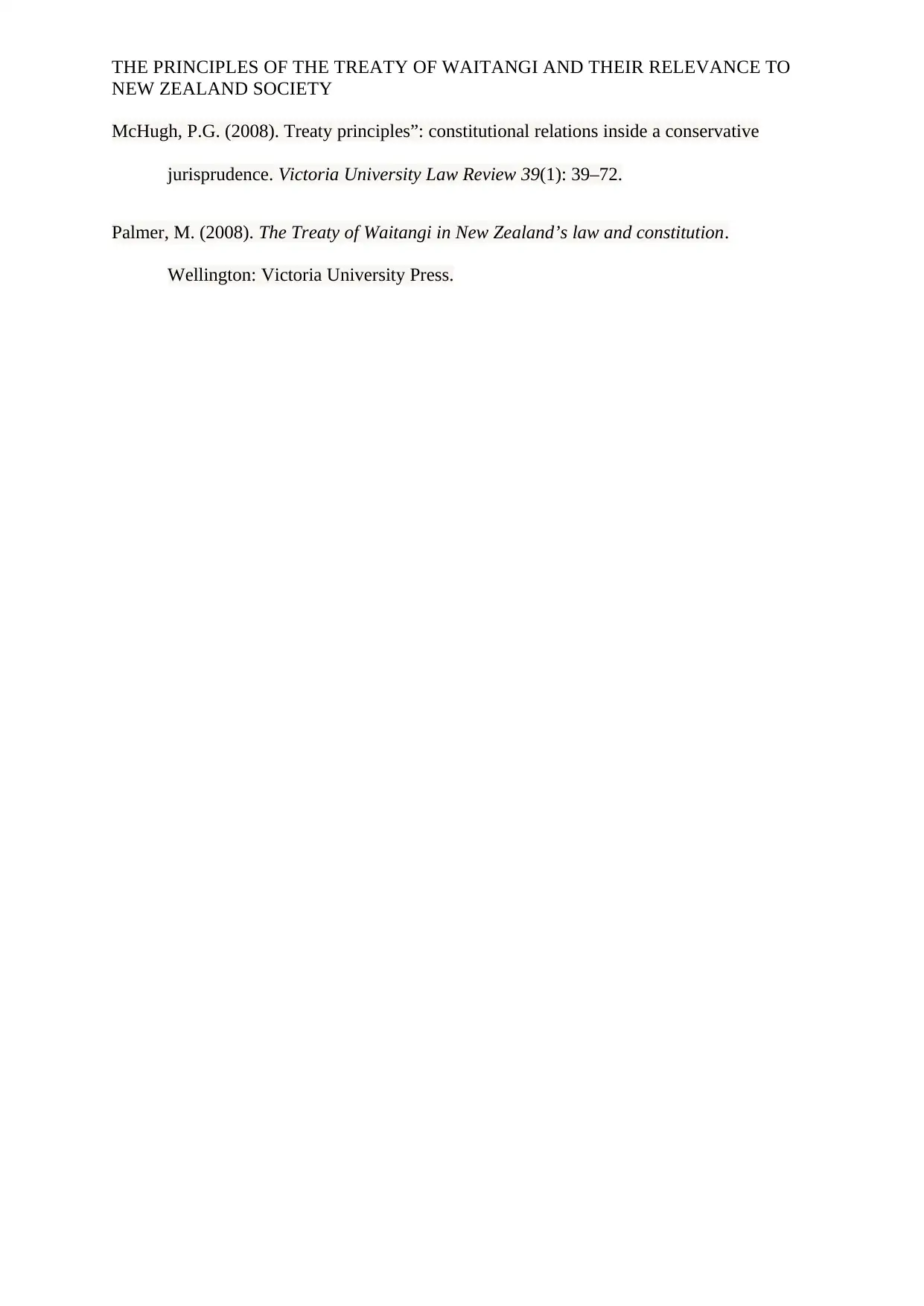
THE PRINCIPLES OF THE TREATY OF WAITANGI AND THEIR RELEVANCE TO
NEW ZEALAND SOCIETY
McHugh, P.G. (2008). Treaty principles”: constitutional relations inside a conservative
jurisprudence. Victoria University Law Review 39(1): 39–72.
Palmer, M. (2008). The Treaty of Waitangi in New Zealand’s law and constitution.
Wellington: Victoria University Press.
NEW ZEALAND SOCIETY
McHugh, P.G. (2008). Treaty principles”: constitutional relations inside a conservative
jurisprudence. Victoria University Law Review 39(1): 39–72.
Palmer, M. (2008). The Treaty of Waitangi in New Zealand’s law and constitution.
Wellington: Victoria University Press.
1 out of 7
Related Documents
Your All-in-One AI-Powered Toolkit for Academic Success.
+13062052269
info@desklib.com
Available 24*7 on WhatsApp / Email
![[object Object]](/_next/static/media/star-bottom.7253800d.svg)
Unlock your academic potential
Copyright © 2020–2025 A2Z Services. All Rights Reserved. Developed and managed by ZUCOL.





